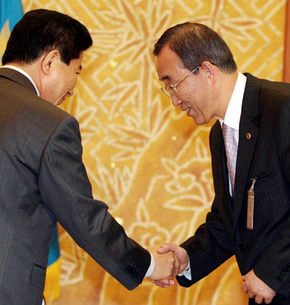 |
|
Foreign Minister Ban Ki-moon shakes hands with President Roh Moo-hyun at Cheong Wa Dae on October 2. Yonhap News.
|
Both are traditional 'opinion makers' on the Security Council
A high evaluation for South Korean Foreign Minister Ban Ki-moon in four straw polls will no doubt help in his drive to secure a position as the next U.N. secretary-general. But the potential minefield of political dynamics in the U.N. Security Council, whose permanent members hold veto power on Ban's nomination, are apparently set to resolve in his favor, as well. Suh Dae-won, former first deputy director of the National Intelligence Service (NIS), said, "It is natural that the United States is important [in selecting the U.N. secretary-general],'' mentioning China as the nation among the four other permanent members that usually establishes its own separate position. Backing up the former NIS director's words is The Economist, the renowned British weekly, which on September 28 said that a candidate who is supported by the U.S. and China will take the post. In fact, that opinion is traditionally cited by U.N. watchers and within the organization itself. The decision-making of the Security Council, in fact, is formed mainly by a U.S.-led bloc and China. England consistently supports the United States and France exercises very limited power on most issues. Unlike the former Soviet Union, Russia hardly has enough clout to oppose the U.S. In most cases, the U.S. takes the initiative and discusses it initially with England and then with France. After this, the U.S. discusses with Russia, and finally with China. China is in a disadvantageous position, as it stands to be isolated.The polls at the Security Council, however, have manifested themselves differently. According to Suh, China has said that it is Asia's turn to assume the post as the next U.N. secretary-general, making it difficult for the bloc of the U.S., England, and France to take any stance against Ban's bid. At first, the U.S., England, and France showed a reserved position toward the search for a new U.N. secretary-general, seeking a figure from Eastern European nations. Washington's criterion of a "pro-U.S." figure had to do with desired support for the Iraq war rather than a traditional partnership. John Bolton, U.S. ambassador to the U.N., also indicated that for a number of practical reasons, a candidate from an Eastern European nation such as Poland would fit such a criterion. Russia, however, raised objection to this, concerned that the U.S. might use its candidate to extend its influence to Eastern Europe. Because of the three allies pushing forward with the 'Eastern Europe card,' Russia appears to have changed its position, deciding to support Asia. The triumvirate of the U.S., U.K., and France could find no logical opposition to the demand for someone from an Asian nation to be the next head of the U.N. The next problem was from which nation in Asia the new leader would come. The United States may have chosen Korea considering a traditional partnership between the two nations. In consideration of Ban's personal inclinations and career, he is close to pro-U.S. sentiments. Such a factor may have a positive effect in the U.S.'s endorsement of Ban. China apparently may have thought that a too pro-U.S. figure would not serve their interests. Former NIS director Suh said, "If the Korean candidate were a conservative pro-U.S. figure, it would be difficult to win China's support." However, it appears that China is behind Ban's nomination, as well, say sources. In this respect, Ban's assuming the post of the U.N. secretary-general would be a result of a 'balanced pragmatic foreign policy amid the U.S. and China' as advocated by the Roh administration. In short, from a regional point of view, China's leadership and the strengthened voice of Asia will have borne fruit.






